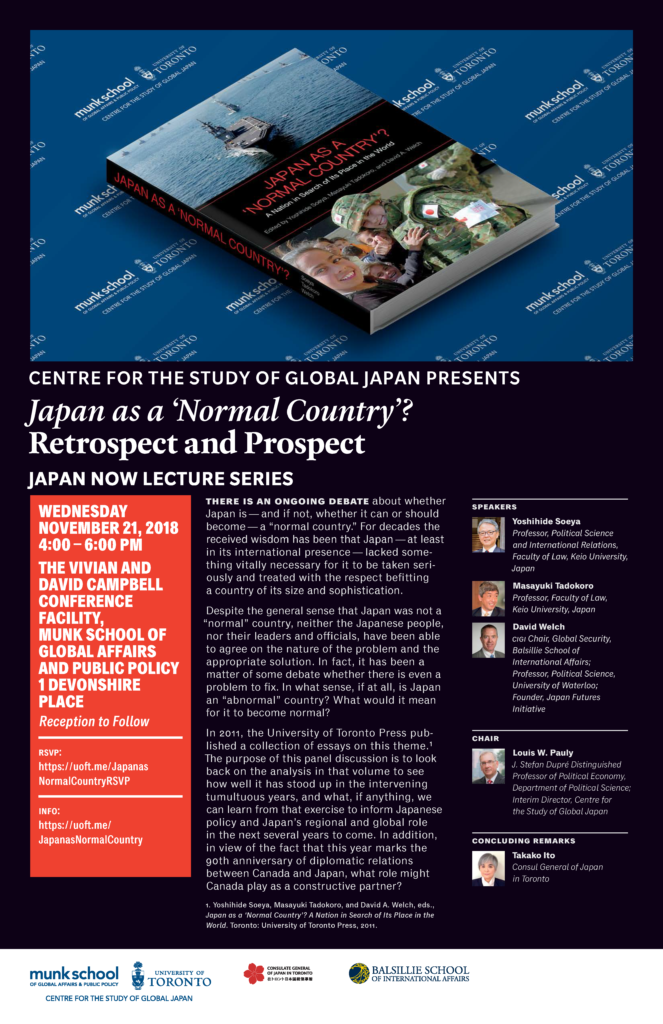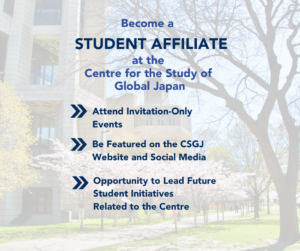Japan as a 'Normal Country'? Retrospect and Prospect
Wednesday, November 21st, 2018
| Date | Time | Location |
|---|---|---|
| Wednesday, November 21, 2018 | 4:00PM - 6:00PM | The Vivian and David Campbell Conference Facility, Munk School of Global Affairs & Public Policy 1 Devonshire Place |
Series
Japan Now Lecture Series
Description
THERE IS AN ONGOING DEBATE ABOUT WHETHER JAPAN IS—and if not, whether it can or should become—a “normal country.” For decades the received wisdom has been that Japan—at least in its international presence—lacked something vitally necessary for it to be taken seriously and treated with the respect befitting a country of its size and sophistication. Despite the general sense that Japan was not a “normal” country, neither the Japanese people, nor their leaders and officials, have been able to agree on the nature of the problem and the appropriate solution. For that matter, it has been a matter of some debate whether there is even a problem to fix. In what sense, if at all, is Japan an “abnormal” country? What would it mean for it to become normal? In 2011, the University of Toronto Press published a collection of essays on this theme[1]. The purpose of this symposium was to look back on the analysis in that volume to see how well it has stood up in the intervening tumultuous years, and what, if anything, we can learn from that exercise to inform Japanese policy and Japan’s regional and global role in the next several years to come. In addition, in view of the fact that 2018 marked the 90th anniversary of diplomatic relations between Canada and Japan, what role might Canada play as a constructive partner? [1] Yoshihide Soeya, Masayuki Tadokoro, and David A. Welch, eds., Japan as a ‘Normal Country’? A Nation in Search of Its Place in the World. Toronto: University of Toronto Press, 2011.
Panelist Biographies: Yoshihide Soeya is Professor of political science and international relations at the Faculty of Law of Keio University. His areas of interest are politics and security in East Asia, and Japanese diplomacy and its external relations. He received Ph.D. from the University of Michigan in 1987, majoring in world politics. He served as the Director of the Institute of East Asian Studies of the same university for six years until September 2013, and as the Director of its Center for Contemporary Korean Studies for five years until March 2016. Recently, Dr. Soeya was a Japan Scholar of the Woodrow Wilson Center in Washington D.C. from September 2013 to January 2014, and a Korea Foundation Fellow affiliated with the ASAN Institute in Seoul in March-May 2014. His most recent publications in English include “The Rise of China in Asia: Japan at the Nexus,” in Asle Toje, ed., Will China’s Rise be Peaceful? Security, Stability, and Legitimacy (Oxford: Oxford University Press, 2018), and “The Case for an Alternative Strategy for Japan: Beyond the Article 9-Alliance Regime,” in Michael J. Green and Zack Cooper, eds., Postwar Japan: Growth, Security and Uncertainty since 1945 (Washington D.C.: Center for Strategic and International Studies, 2017).
Masayuki Tadokoro is Professor of International Relations at Keio University, Tokyo, Japan. Born in Osaka, he attended Kyoto University and the London School of Economics. Previously he was a professor at the National Defense Academy. In 1988-89, he stayed in Washington D.C. a Fellow of the American Council of Learned Societies, and in 1991 he taught for a semester as Fulbright Scholar in Residence at the University of Pittsburgh. His primary field is international political economy, but he works also on Japanese foreign and security policy. His publications include International Political Economy (Nagoya University Press, 2008); The Dollar transcends “America” (Chuokoron Shinsha, 2001); and The Realities of the UN: A Budgetary Analysis (Yuhikaku, 1996). His recent publications in English include, “After the Dollar?”, International Relations of the Asia Pacific 10:3 (2010); and “Why did Japan fail to become the ‘Britain’ of Asia”, in David Wolff et al., eds., The Russo-Japanese War in Global Perspective (Brill, 2007). He also edited with David Welch and Yoshihide Soeya, Japan as a ‘Normal Country’?: A Nation in Search of Its Place in the World, (Toronto U.P. 2011). Changed Discourses on Demography in Japan, in Silvio Beretta et al, eds, Italy and Japan: How Similar Are They? , (Springer, 2014).
David A. Welch is CIGI Chair of Global Security at the Balsillie School of International Affairs and Professor of Political Science at the University of Waterloo. His 2005 book Painful Choices: A Theory of Foreign Policy Change (Princeton University Press) is the inaugural winner of the International Studies Association ISSS Book Award for the best book published in 2005 or 2006, and his 1993 book Justice and the Genesis of War (Cambridge University Press) is the winner of the 1994 Edgar S. Furniss Award for an Outstanding Contribution to National Security Studies. Welch is also co-author of Understanding Global Conflict and Cooperation 10th ed. (Pearson Longman, 2016); Virtual JFK: Vietnam If Kennedy had Lived (Rowman & Littlefield, 2009); The Cuban Missile Crisis: A Concise History (Oxford University Press, 2nd ed. 2011); On the Brink: Americans and Soviets Reexamine the Cuban Missile Crisis(2nd ed., Noonday 1990); and Cuba on the Brink: Castro, The Missile Crisis, and the Soviet Collapse (2nd ed., Rowman & Littlefield, 2002). Welch is also co-editor of Japan as a ‘Normal Country’? A Nation In Search of Its Place in the World (University of Toronto Press, 2011) and Intelligence and the Cuban Missile Crisis (Frank Cass, 1998). His articles have appeared in Asian Perspective, Canadian Foreign Policy Journal, Ethics and International Affairs, Foreign Affairs, The Georgetown Journal of International Affairs, Intelligence and National Security, International Security, International Journal, International Negotiation, International Studies Quarterly, The Journal of Conflict Resolution, The Mershon International Studies Review, The Review of International Studies, and Security Studies.
Event Announcement

If you are attending a Munk School event and require accommodation(s), please email the event contact listed above to make appropriate arrangements.
Disclaimer: Please note that events posted on this website are considered to be public events – unless otherwise stated – and you are choosing to enter a space where your image and/or voice may be captured as part of event proceedings that may be made public as part of a broadcast, webcast, or publication (online and in print). We make every effort to ensure your personal information is kept and used in compliance with the Freedom of Information and Protection of Privacy Act (FIPPA). If you have any questions please get in touch with our office at munkschool@utoronto.ca or 416-946-8900.
